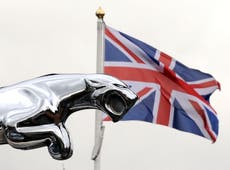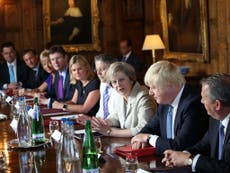'The Week That Broke Brexit' asks an interesting question about Boris Johnson (you already know the answer)
It is one of history's great counterfactuals: If Boris Johnson wasn't Boris Johnson and Michael Gove wasn't Michael Gove, would Boris Johnson and Michael Gove be able to sort out the mess Boris Johnson and Michael Gove have made?

In the Telegraph documentary, The Week That Broke Brexit, you won’t be shocked to learn that the week in question is the one that begins the very second Brexit happens, which if nothing else provides a clear indication of the overall build quality of the product in question.
A documentary on The Week That Broke, for example, the Terry Vitton handbag you bought off ebay for eight quid, might look as far ahead as the third or fourth week after delivery.
But Brexit, we learn with the benefit of two years hindsight absolutely no one needed, was broken in its very first days, functioning not even as long as one of Derek Trotter’s Russian Army camcorders and coming with a precisely identical lack of statutory rights for the customer.
It was broke the second it was out the back of the three wheeled van, even those entirely responsible for selling it have now concluded, this documentary serving as the retro white 1920s two handed telephone for them to shout their excuses down. And, naturally, Brexit comes with no warranty period, no refunds and no returns.
It’s best to understand The Week That Broke Brexit as a Benny Hill style chase around the Brexit pasture, all the usual faces being present – your Farages, your Banks’s, your Suzanne Evans’s, your Matthew Elliotts – and all of them scuttling away as fast as they possibly can from anything that looks or sounds like personal responsibility for their own actions and the blindingly foreseeable consequences of them.
If only as a a tableau of moral cowardice as the central characteristic of the worst party of government this country has ever known, it is worth preserving.
It is, unsurprisingly, David Cameron who takes most of the blame. Suzanne Evans, Gisela Stuart, Matthew Elliott, all line up to attack the Prime Minister for his “dereliction of duty” for not preparing the civil service for the eventuality of a Leave vote.
History does not recall the negligence or otherwise of the Fire Safety Officer responsible for the Hiroshima Prefecture in August 1945. But neither in the immediate aftermath nor the long years since have those who dropped a nuclear bomb directly on his head considered the question worth raising through the medium of an online documentary. It is a lesson you might think no one would have to learn.
We then segue to that hallowed dawn of two and a bit years ago, and the sight of hundreds of cyclist protestors banging on Boris Johnson’s car bonnet shouting “scum”, which is certainly the right context in which to consider the idea that everything would have worked out just fine for a nation as furiously angry and bitterly divided now as it was then if, a mile down the road in Downing Street, some more advanced plans were sitting in a filing cabinet somewhere.
(Craig Oliver is on hand at this point to suggest, as it happens on the the day before the cabinet is off to Chequers finally to explode over its irreconcilable differences on Brexit, that David Cameron doing some pre-emptive plans on it might not, on balance, have been sufficient).
Later in the film, it becomes apparent that Brexit, though broken from the start, was mainly broken by Theresa May over a far longer period of time.
This point is made first by Ukip donor Arron Banks, who calls her a “third rate administrator.” He, like others, think the problem is that Brexit is now being delivered by someone “doesn’t believe in Brexit” a point they make in perfect symmetry with blaming the de facto leader of the referendum campaign David Cameron, for not doing enough.
The point on Theresa May’s administrative capabilities is later taken up by Banks’s press officer and occasional Belizean trade envoy Andy Wigmore, a man well qualified to make such judgements. After all it was he and he alone who spectacularly failed to organise a pro Brexit pop concert in Birmingham, which had to be called off shortly after 2wo of the 4our remaining members of 5ive pulled out, citing the fact they had not been told it was anything to do with Brexit. (Some former members of Buck’s Fizz, still at work but for legal reasons under the name “Formerly of Buck’s Fizz” took this as their lead to do the same.)
Serving mainly as a vehicle of historical revisionism for the most feckless, shambolic, international embarrassment of a Foreign Secretary this or quite frankly any country might ever have known and who also used to be a Telegraph columnist and one day, perhaps as soon as Saturday, will be again, it also turns its would be villain, Michael Gove, into a hero in what feels like it might have been an accident.
We learn via Boris Johnsons’ former aide Will Walden that the idea Gove “suddenly realised” Boris Johnson wasn’t up to the job of Prime Minister is “ridiculous.” It was in fact his “over-weaning ambition” that did for him, and a Telegraph journalist then points out that “karma came quickly” for Gove after his his fellow MPs failed to back him in the subsequent leadership contest.
But the unfortunate consequence is that, as anyone who has paid even the most microscopic bit of attention to Boris Johnson’s stint at the Foreign Office knows, Gove’s sabotaging of Johnson is now an act of clear national heroism.
Ultimately, Gove's intervention sent Boris Johnson to the Foreign Office instead of to Number 10, where as the nation's senior diplomat, he has since made a public joke about dead bodies lying on the beach in Libya, and accidentally almost extended the prison sentence of a wrongly jailed British national in Iran. So the question of whether he would have made a great Prime Minister, if not known for certain, has been hinted at.
Gove’s own defence at the time, and now repeated in the film is that he foresaw, in those mad days, that Boris Johnson definitely wasn’t up to the job. And that reality is now so clear as to be irrefutable.
All of which ultimately builds at the end to an enthralling question. Had all gone to plan, Boris Johnson would be Prime Minister now, and Michael Gove his Chancellor.
If Boris Johnson hadn’t gone off and played cricket the day after the referendum, hosted a drunken barbecue and generally been quite useless, advertising both to the nation and to Michael Gove his utter unsuitability for the serious task ahead, would Gove have decided ultimately to knife him? Or, as Boris Johnson’s friends suggest, would Gove’s ambition, driven on by his wife, ultimately have got the better of him anyway?
It is one of history’s great counterfactuals, right up there with Cleopatra’s nose and John Smith’s heart attack: If Boris Johnson wasn’t Boris Johnson and Michael Gove wasn’t Michael Gove, would all of the things Michael Gove and Boris Johnson did that have now gone so irredeemably wrong suddenly all be absolutely fine?
What a tragedy to think we’ll never know.







Join our commenting forum
Join thought-provoking conversations, follow other Independent readers and see their replies